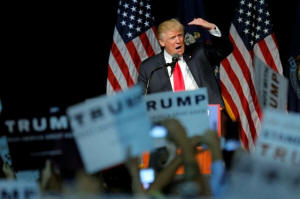|
Trump's opposition to trade deals fuels
internal party opposition
 Send a link to a friend
Send a link to a friend
 [June 30, 2016]
By Ginger Gibson [June 30, 2016]
By Ginger Gibson
WASHINGTON (Reuters) - Presidential
candidate Donald Trump on Wednesday lashed out at the U.S. Chamber of
Commerce's scathing criticism of his stance on trade, highlighting
divisions within the Republican Party that threaten unity ahead of the
Nov. 8 election.
At a campaign rally in Maine on Wednesday, Trump called the
nation's largest business association "controlled totally by various
groups of people who don’t care about you whatsoever."
He said new trade deals should be negotiated because foreign
countries are taking advantage of America.
"Every country that we do business with us look at us as the stupid
people with the penny bank," Trump said Wednesday at the rally in
Bangor, Maine.
The Washington-based lobbying group, which represents the United
States' largest companies and business interests, is typically a
reliable backer of Republican policies.
But on Tuesday it took issue with Trump's vocal opposition to trade
deals, calling his proposals "dangerous" ideas that would push the
United States into another recession.
Trump said the Chamber's argument that his policies would cause a
trade war were incorrect because the United States was already at a
deficit.
"We’re already losing the trade war, we lost the trade war," Trump
said. "Nothing can happen worse than is happening now."
 In speeches on Tuesday, Trump called for renegotiating or scrapping
the North American Free Trade Agreement (NAFTA) with Canada and
Mexico, calling it a job killer, and reiterated opposition to the
pending Trans-Pacific Partnership among the United States and 11
other Pacific Rim countries. He also lambasted China's trade and
currency policies.
The Chamber has consistently backed trade deals.
The public squabbling between the presumptive Republican nominee and
the business group was unusual, one of a series of reminders that
Trump still struggles to unite his party behind his campaign. The
Republicans and many business leaders tend to share policy goals and
work in lockstep, and many business leaders have traditionally been
big donors to Republican candidates.
So far, the Chamber's political action committee has donated
$134,000 to federal candidates or their committees, with $127,500 of
that total going to Republicans, according to U.S. government
campaign finance records.
Billionaire Republican donor Paul Singer, who bankrolled an effort
to try to defeat Trump during the campaign's nominating phase, said
on Wednesday that a Trump presidency and his trade positions would
almost certainly lead to a global depression.
"The most impactful of the economic policies that I recall him
coming out for are these anti-trade policies," Singer said during a
panel discussion at the Aspen Ideas Festival in Colorado, according
to CNBC.
But opposing trade deals has proven a winning strategy for Trump
among voters concerned about the loss of manufacturing jobs.
Art Laffer, an economic adviser to President Ronald Reagan who
supports Trump, said he did not like the tone of Trump’s speech on
Tuesday but thought it was an improvement over his past comments on
trade.
[to top of second column] |

Republican presidential candidate Donald Trump takes the stage at a
campaign rally in Bangor, Maine, June 29, 2016. REUTERS/Brian Snyder

"It’s not terribly alarming to me,” Laffer said. “I didn’t see any
45 percent tariffs across the board. ...
"I saw negotiating better trade deals rather than throwing away all
the trade deals we have now. He points out the flaws in these
trades, and that’s all true," Laffer said. "I don’t like the tone of
it, but I dislike the tone less today than I did three weeks ago.”
Peter Navarro, a Trump trade policy adviser, defended the
candidate's position.
“Here’s the central point to understand: The White House has been
utterly and completely soft on China’s illegal trade practices,”
said Navarro, a professor at the University of California, Irvine.
"The status quo is the worst of all possible worlds for the United
States."
Trump also took fire from for his positions on trade from Democrats.
In a call organized by rival Hillary Clinton's presidential
campaign, U.S. Senator Mark Warner of Virginia, a former businessman
and tech entrepreneur, said that while the country needed to do a
better job protecting workers, more resources should be put into
training them for a new economy.
He also noted that it was unusual to see a Republican
standard-bearer and the Chamber divide.
“You’ve really got a special circumstance when the U.S. Chamber of
Commerce” responded to Trump’s economic plan with a “full-fledged
onslaught,” Warner said. “No one could have predicted this kind of
election season.”


Clinton held no public campaign events on Wednesday but did announce
she would appear next week with President Barack Obama, the first
time this year that he and his former Secretary of State have
campaigned together.
(Reporting by Ginger Gibson, Grant Smith, Amanda Becker, Alana Wise
and Emily Stephenson; Editing by Jonathan Oatis)
[© 2016 Thomson Reuters. All rights
reserved.]
Copyright 2016 Reuters. All rights reserved. This material may not be published,
broadcast, rewritten or redistributed. |